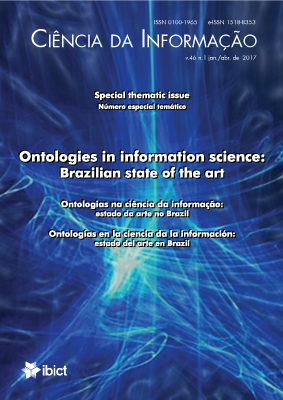Guidelines for writing definitions in ontologies
DOI:
https://doi.org/10.18225/ci.inf.v46i1.4015Palabras clave:
Definitions, Ontology, Textual definitions, Definitions in ontologies, Guidelines, Design patterns, Applied ontologyResumen
Ontologies are being used increasingly to promote the reusability of scientific information by allowing heterogeneous data to be integrated under a common, normalized representation. Definitions play a central role in the use of ontologies both by humans and by computers. Textual definitions allow ontologists and data curators to understand the intended meaning of ontology terms and to use these terms in a consistent fashion across contexts. Logical definitions allow machines to check the integrity of ontologies and reason over data annotated with ontology terms to make inferences that promote knowledge discovery. Therefore, it is important not only to include in ontologies multiple types of definitions in both formal and in natural languages, but also to ensure that these definitions meet good quality standards so they are useful. While tools such as Protégé can assist in creating well-formed logical definitions, producing good definitions in a natural language is still to a large extent a matter of human ingenuity supported at best by just a small number of general principles. For lack of more precise guidelines, definition authors are often left to their own personal devices. This paper aims to fill this gap by providing the ontology community with a set of principles and conventions to assist in definition writing, editing, and validation, by drawing on existing definition writing principles and guidelines in lexicography, terminology, and logic.Descargas
Los datos de descarga aún no están disponibles.
Descargas
Publicado
28/12/2017
Número
Sección
Parte I - Contribuições teóricas e metodológicas da pesquisa sobre ontologias
Licencia
- La publicación se reserva el direcho de realizar, en los originales, cambios de orden normativa, ortográfica y gramatical, para mantener la norma culta del idioma, respetando el estilo de los autores;
- Las pruebas finales no seran enviadas a los autores;
- Los trabajos publicados pasan a ser propriedad de la revista Ciência da Informação, siendo su reimpresión total o parcial, sujeta a autorización expresa de la dirección del IBICT;
- Debe ser consignada la fuente de publicação original;
- Són de exclusiva responsabilidad de los autores las opiniones emitidas en sus artículos;
- Cada autor recibirá dos ejemplares de la revista, caso esté disponible en el formato impreso.




























